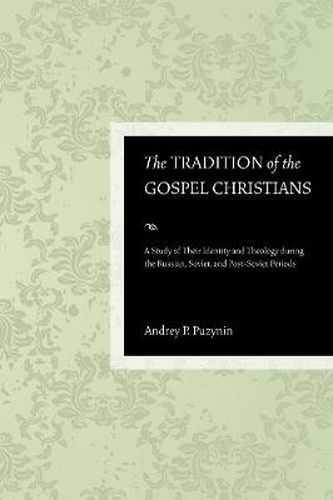Readings Newsletter
Become a Readings Member to make your shopping experience even easier.
Sign in or sign up for free!
You’re not far away from qualifying for FREE standard shipping within Australia
You’ve qualified for FREE standard shipping within Australia
The cart is loading…






This title is printed to order. This book may have been self-published. If so, we cannot guarantee the quality of the content. In the main most books will have gone through the editing process however some may not. We therefore suggest that you be aware of this before ordering this book. If in doubt check either the author or publisher’s details as we are unable to accept any returns unless they are faulty. Please contact us if you have any questions.
The Tradition of the Gospel Christians explores the post-Soviet tradition of evangelical Christians originating from the ministry of the Victorian revivalist preacher Lord Radstock in St. Petersburg in the 1870s. In an effort to resolve the current evangelical crises of theology and identity, this study provides an analysis of the tradition’s history reflecting on its restorationist tradition, the contours and vectors of its theology, and its practice of biblical interpretation. The historical analysis reveals that the major causes of the crises of identity and theology pertain to the socio-political upheavals, which, in turn, led the tradition to develop strategies to maintain relevance in its changed contexts. The socio-political shifts were also responsible for the lack of emphasis on research and scholarship, which contributed to a difficulty in finding the necessary resources and intellectual virtues to deal with the collapse of the Soviet Union. Building on the discoveries of the historical analysis, Andrei P. Puzynin offers a new historical and theological paradigm by reconstructing the self-identifying narrative and theological framework in critical dialogue with recent developments in Anglo-American evangelicalism and postliberalism. Following the trajectory of the evangelical tradition in the post-Soviet context, a trajectory which relies on Western thought, the book adopts the narrative theological method of reading the world though the lens of Scripture. The self-identifying narrative of the community is reconstructed through a theological reading of the previous identity-constructions, in the light of recent discussions on Christ and the powers. The result of this study helpfully explains the dynamics of Eastern evangelicalism in a traditionally Russian Orthodox setting.
$9.00 standard shipping within Australia
FREE standard shipping within Australia for orders over $100.00
Express & International shipping calculated at checkout
This title is printed to order. This book may have been self-published. If so, we cannot guarantee the quality of the content. In the main most books will have gone through the editing process however some may not. We therefore suggest that you be aware of this before ordering this book. If in doubt check either the author or publisher’s details as we are unable to accept any returns unless they are faulty. Please contact us if you have any questions.
The Tradition of the Gospel Christians explores the post-Soviet tradition of evangelical Christians originating from the ministry of the Victorian revivalist preacher Lord Radstock in St. Petersburg in the 1870s. In an effort to resolve the current evangelical crises of theology and identity, this study provides an analysis of the tradition’s history reflecting on its restorationist tradition, the contours and vectors of its theology, and its practice of biblical interpretation. The historical analysis reveals that the major causes of the crises of identity and theology pertain to the socio-political upheavals, which, in turn, led the tradition to develop strategies to maintain relevance in its changed contexts. The socio-political shifts were also responsible for the lack of emphasis on research and scholarship, which contributed to a difficulty in finding the necessary resources and intellectual virtues to deal with the collapse of the Soviet Union. Building on the discoveries of the historical analysis, Andrei P. Puzynin offers a new historical and theological paradigm by reconstructing the self-identifying narrative and theological framework in critical dialogue with recent developments in Anglo-American evangelicalism and postliberalism. Following the trajectory of the evangelical tradition in the post-Soviet context, a trajectory which relies on Western thought, the book adopts the narrative theological method of reading the world though the lens of Scripture. The self-identifying narrative of the community is reconstructed through a theological reading of the previous identity-constructions, in the light of recent discussions on Christ and the powers. The result of this study helpfully explains the dynamics of Eastern evangelicalism in a traditionally Russian Orthodox setting.